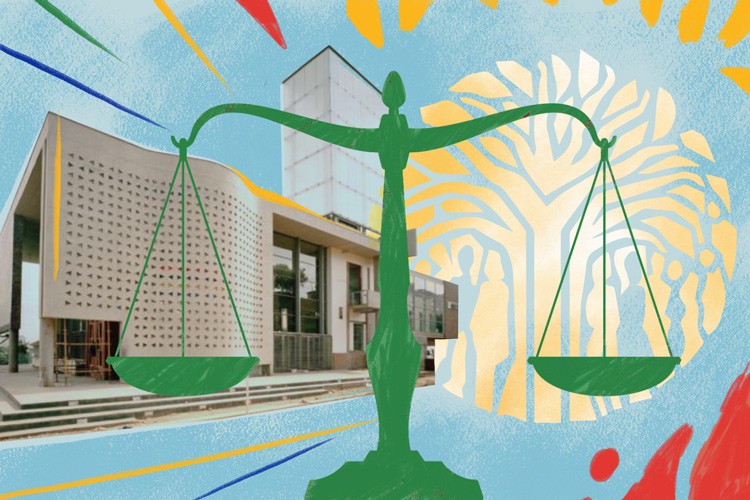Concourt challenge to Electoral Act
The Independent Candidate Association of South Africa says independents have to get more votes for a seat than political party candidates
There is still a lack of clarity about how next year’s election will be run. Illustration: Lisa Nelson
- The Independent Candidate Association of South Africa has applied for direct access to the Constitutional Court in a challenge to the amended Electoral Act.
- The Act was amended to allow independent candidates to run for election.
- The association says the Act does not allow independents to compete on a level playing field with party political candidates.
- It says an independent will need many more votes to gain a seat than a party candidate.
The Independent Candidate Association of South Africa has applied for direct access to the Constitutional Court to consider “a very narrow constitutional challenge” to the Electoral Amendment Act over how it deals with independent candidates.
In his affidavit, Michael Louis, chairperson of the association, says the amended act, which came into force in April, made it possible for “independents” (candidates not belonging to a political party) to compete in national and provincial elections. But, he says, it does so in a manner in which the playing fields are not level.
An independent must get many more votes than a political party candidate will need to gain a seat in the National Assembly. This is because the schedule to the Act dictates that independents are only allowed to compete for regional seats and not so-called “compensatory seats”.
“The effect of this is that the parties compete for 400 seats and the independents for 200 seats. Naturally this increases the quota for independents to gain seats drastically,” he said.
“There is no justification for this 200/200 split between regional and compensatory seats. An increase of the regional seats to 350 and a corresponding decrease of the compensatory seats to 50 is sought as the relief in this application.”
Louis said the 200/200 split was irrational and unconstitutional because independent citizens and those who voted for them were not being treated equally, and a vote for an independent under the present regulations counted less towards the outcome and made it more difficult for an independent to be elected, for no good reason.
This undermined the fairness of the outcome of the election.
“Due to the unequal treatment, there are bound to be a large number of wasted and excess votes for independents which will be allocated to parties, thereby skewing the outcome,” he said.
The fact that there were no “compensatory seats” in provincial legislature elections, was proof that they were not a necessary feature of the electoral system, he said.
The association says an amendment is required ahead of next year’s national and provincial elections, and that there is not enough time for the matter to go through the normal court process, starting with the high court.
It has also asked the apex court, that should it support the application and wished to refer any amendments back to Parliament, that it orders a “reading in” of the changes to the Act in the meantime so that these are applicable to the 2024 elections.
Louis said the association has about 29 members intent on running as independents, but it had received hundreds of inquiries from others.
“Until we know the final impact of the Act that will regulate barriers to entry of independents we are limiting membership,” he said.
He said the remedy was simple and it would go some way to ensuring overall proportionality in the composition of the National Assembly by bringing the quota needed by independents closer to those needed for the parties and to “restore a measure of equality of the vote”.
Relying on an expert report produced by mathematics and computer science expert Michael Atkins, Louis said the reduction of the compensatory seats from 200 to 50 would “hit the sweet spot”, where the quotas for independents and parties would approximate each other and overall proportionality would be retained.
It would also not disturb the proportionality of seat distribution amongst the parties.
Regarding direct access to the court, Louis said, it was in the interests of justice and was of significant public interest, particularly in light of the looming election and the preparations necessary for it.
The respondents – the President, the Speaker of the National Assembly and Chairperson of the National Council of Provinces, the Minister of Home Affairs, the Independent Electoral Commission and all political parties registered for elections – have still to file papers.
Support independent journalism
Donate using Payfast

Don't miss out on the latest news
We respect your privacy, and promise we won't spam you.
Next: Patients spend their weekends waiting to be seen at Mamelodi clinic
Previous: Magistrate denies bail to four accused in the Thabo Bester escape
© 2023 GroundUp. This article is licensed under a Creative Commons Attribution-NoDerivatives 4.0 International License.
You may republish this article, so long as you credit the authors and GroundUp, and do not change the text. Please include a link back to the original article.
We put an invisible pixel in the article so that we can count traffic to republishers. All analytics tools are solely on our servers. We do not give our logs to any third party. Logs are deleted after two weeks. We do not use any IP address identifying information except to count regional traffic. We are solely interested in counting hits, not tracking users. If you republish, please do not delete the invisible pixel.

